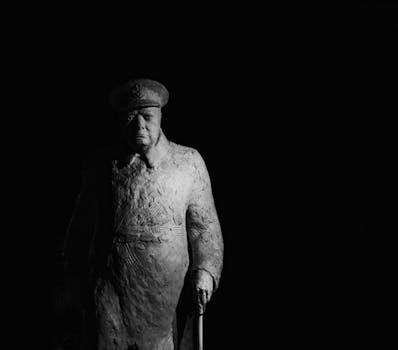Winston Churchill: Leadership in Times of War

Winston Churchill's leadership during World War II is often hailed as a pivotal force in the Allied victory against the Axis powers. Known for his steadfast resolve, stirring speeches, and unyielding optimism, Churchill guided Britain through its darkest hours. His strategic acumen and ability to inspire both military personnel and civilians alike set him apart as one of history's most influential leaders.
Early Life and Political Career
Winston Churchill was born on November 30, 1874, into an aristocratic family. He began his career in the British Army, serving in India and Sudan, and later worked as a war correspondent. These early experiences shaped his understanding of military strategy and political affairs.
Churchill entered politics in 1900, joining the Conservative Party. However, his political journey was marked by shifts; he joined the Liberal Party in 1904 before returning to the Conservatives in the 1920s. His early political career included roles such as President of the Board of Trade and Home Secretary. Despite facing setbacks, including a period of political isolation in the 1930s, Churchill remained a vocal critic of appeasement policies toward Nazi Germany.
Churchill's pre-war years were characterized by his warnings about the rise of Adolf Hitler and the need for Britain to rearm. These warnings were largely ignored until the outbreak of World War II, at which point Churchill's foresight was recognized.
Leadership During World War II
On May 10, 1940, Winston Churchill became Prime Minister of the United Kingdom. His leadership was immediately tested by the fall of France and the imminent threat of German invasion. Churchill's response was resolute; he refused to consider surrender and instead prepared Britain for a prolonged struggle.
Churchill's speeches during this time were crucial in maintaining public morale. Phrases like "We shall fight on the beaches" and "Their finest hour" became rallying cries for a nation under siege. His ability to communicate effectively with both Parliament and the general public was instrumental in unifying Britain.
In addition to his oratory skills, Churchill demonstrated strategic brilliance. He played a key role in forming alliances with the United States and the Soviet Union, recognizing that cooperation among the Allies was essential for victory.
Key Strategies and Decisions
Churchill's strategic decisions during World War II had far-reaching impacts. One notable example is Operation Dynamo, the evacuation of Allied soldiers from Dunkirk in 1940. This operation saved over 300,000 troops who would have otherwise been captured or killed by advancing German forces.
- The Battle of Britain: Churchill's leadership during this critical air campaign ensured that Britain could withstand German aerial assaults.
- The North Africa Campaign: His insistence on prioritizing this front led to significant victories against Axis forces.
- D-Day Invasion: Churchill supported the planning and execution of this massive Allied operation that eventually led to the liberation of Western Europe.
These strategic decisions showcased Churchill's ability to balance immediate military needs with long-term goals, ensuring that resources were allocated effectively across various fronts.
Post-War Period
After World War II ended in 1945, Winston Churchill faced new challenges. Despite his wartime popularity, he lost the general election that year but continued to influence global politics as Leader of the Opposition. He returned as Prime Minister from 1951 to 1955 during which time he focused on foreign policy issues like maintaining Britain's influence in post-war Europe.
Churchill also contributed significantly to literature; he won the Nobel Prize for Literature in 1953 for his historical writings, including his multi-volume work "The Second World War."
Legacy and Influence
Winston Churchill's legacy extends beyond his role as a wartime leader. His speeches continue to be studied for their rhetorical mastery while his strategic decisions are analyzed by military historians worldwide. Modern leaders often reference Churchill when discussing leadership during crises.
| Aspect | Impact |
|---|---|
| Oratory Skills | Boosted public morale and unified Britain |
| Strategic Alliances | Formed crucial partnerships with U.S. & Soviet Union |
| Military Decisions | Affected key battles like Dunkirk & D-Day |
The Art of Leadership - Lessons from Winston Churchill
A recent TED Talk titled "The Art of Leadership - Lessons from Winston Churchill" explores how modern leaders can learn from Churchill’s example. The speaker highlights his ability to maintain composure under pressure and make difficult decisions swiftly. This talk serves as a reminder that effective leadership requires not only strategic thinking but also emotional intelligence.
Winston Churchill’s leadership during World War II exemplifies resilience, strategic acumen, and inspirational communication. From his early political career through his wartime premiership and post-war contributions, Churchill left an indelible mark on history. His ability to navigate complex challenges and unite people under a common cause remains relevant today.
The lessons drawn from Churchill’s life continue to inform contemporary discussions on leadership. Whether through his powerful speeches or decisive actions, Winston Churchill’s legacy endures as a testament to what determined leadership can achieve in times of crisis.